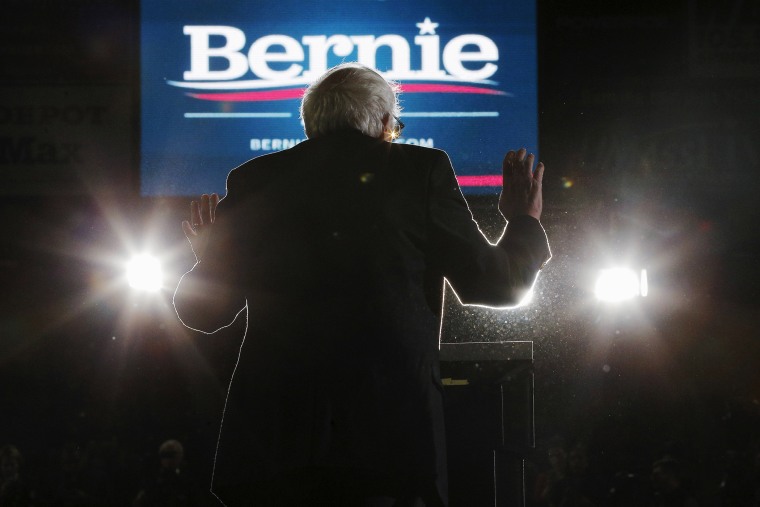Democratic turnout in the first three nominating contests have, by all appearances, fallen short of the party's hopes. When compared against 2008, Democratic participation was down 25% in Iowa, 13% in New Hampshire, and 33% in Nevada.
As we discussed yesterday, that's a fairly significant problem for Bernie Sanders' campaign, not only because his campaign believes its odds improve with greater turnout, but also because so much of his message is built around the idea that Sanders' message will bring new people into the process who are ordinarily alienated and marginalized.
I heard from quite a few Sanders supporters about this -- via email, social media, and elsewhere -- who raised a variety of questions and concerns about the thesis. Some of the pushback was more compelling than other parts, so I thought I'd take a few minutes to defend the thesis and respond to some of the more common questions.
Isn't 2008 an outlier, making it a poor point of comparison?
In 2008, Democrats, desperate to change the nation's course after eight years of Bush/Cheney, turned out in droves, inspired in part by a clash of titans: Hillary Clinton and Barack Obama. When compared to a primary fight like this, a drop in turnout is inevitable, right?
Maybe, but as I mentioned in two previous posts, the whole point of Bernie Sanders' campaign is the idea of a political "revolution" that will have progressive voters excited in ways we haven't seen in a long while. By this reasoning, 2008 is a perfectly appropriate point of comparison -- they were excited eight years ago, and Sanders should have them at least as excited now. So far, however, there's no evidence of that happening.
Why blame Bernie Sanders for reduced turnout instead of Hillary Clinton? Isn't she on the same primary ballot?
Note, I'm not "blaming" anyone for the drop in turnout, and the thesis has nothing to do with assigning responsibility. Rather, the observation is about testing one of the key pillars of the Sanders campaign's platform: he, and he alone, can inspire voters to show up.
Yes, it's a problem for the party overall when turnout declines, but Hillary Clinton isn't the one basing her campaign on the idea that she's the only candidate running this year who can lead a turnout revolution.
Why compare 2016 to 2008 instead of 2012?
This was easily the strangest question I received, but since several readers actually brought it up, I guess I should answer it: I compared 2016 to 2008, and not 2012, because there were no competitive nominating contests in 2012. President Obama was seeking re-election and he faced no meaningful opposition from within the party.
Aren't general-election turnout models different from primary-election turnout models?
I think this is probably the strongest argument for Sanders supporters who are eager to overlook the recent data. Sure, there's been a drop thus far, the argument goes, but that doesn't tell us anything about what would happen in the fall.
But as I wrote yesterday, at the core of Sanders' pitch is a non-traditional appeal: Democrats should take a chance on a 74-year-old democratic socialist, electability concerns notwithstanding, because he has a unique ability to bring more voters into the process.
We can't say with any certainty what would happen in a general election. All we have to go on, for now, is the success of Sanders' turnout model in Iowa, New Hampshire, and South Carolina, where even the senator's own campaign has conceded turnout hasn't been as high as Team Sanders hoped. Given the chance this candidate is asking the party to take, the gamble starts to look like an even greater risk. When Sanders and his proponents argue, "We're not boosting turnout now, but this will definitely work out in the fall," they shouldn't be shocked when the claim faces skepticism.
Isn't 2000 a better point of comparison than 2008?
Several readers referred me to a blog post that argues the 2008 comparison isn't fair, but the 2000 cycle is. The gist of the argument is the search for an apples-to-apples parallel: in 2000, a two-term Democrat was poised to leave office after eight years, just like now, as opposed to 2008, when a two-term Republican was poised to leave office after eight years, which created a different level of progressive appetite for change.
As much as I appreciate the effort, I feel like the argument largely misses the point. Even if we put aside the meaningful differences between 2000 and 2016 -- the population changes, the demographic changes, the changes in Democratic attitudes, the changes in media and social media tools, etc. -- there's a more fundamental bottom line.
Voters are either showing up or they're not. A primary fight is either motivating voters to get off the couch or it isn't. This year, Bernie Sanders and his bold, unapologetic message have been billed as a unique political force -- the kind of revolutionary approach to politics that will inspire the public to realign our entire system. It's a campaign that will build a tower of change on a foundation of turnout, the likes of which our old, stale models are ill equipped to even understand.
Given all of this, I think comparing this year's primaries to the most recent round of primaries seems perfectly fair, but even if you disagree, there is no scenario in which 2016 turnout, at least so far, looks impressive. Even Sanders himself has expressed disappointment about his campaign's ability to get people to show up when it counts.
Maybe it's too early. Maybe Sanders' unique message needs more time to reach more people. Maybe turnout in the next round of contests will show tangible progress and start to justify the campaign's message.
But in the meantime, the numbers aren't backing up the boasts.
